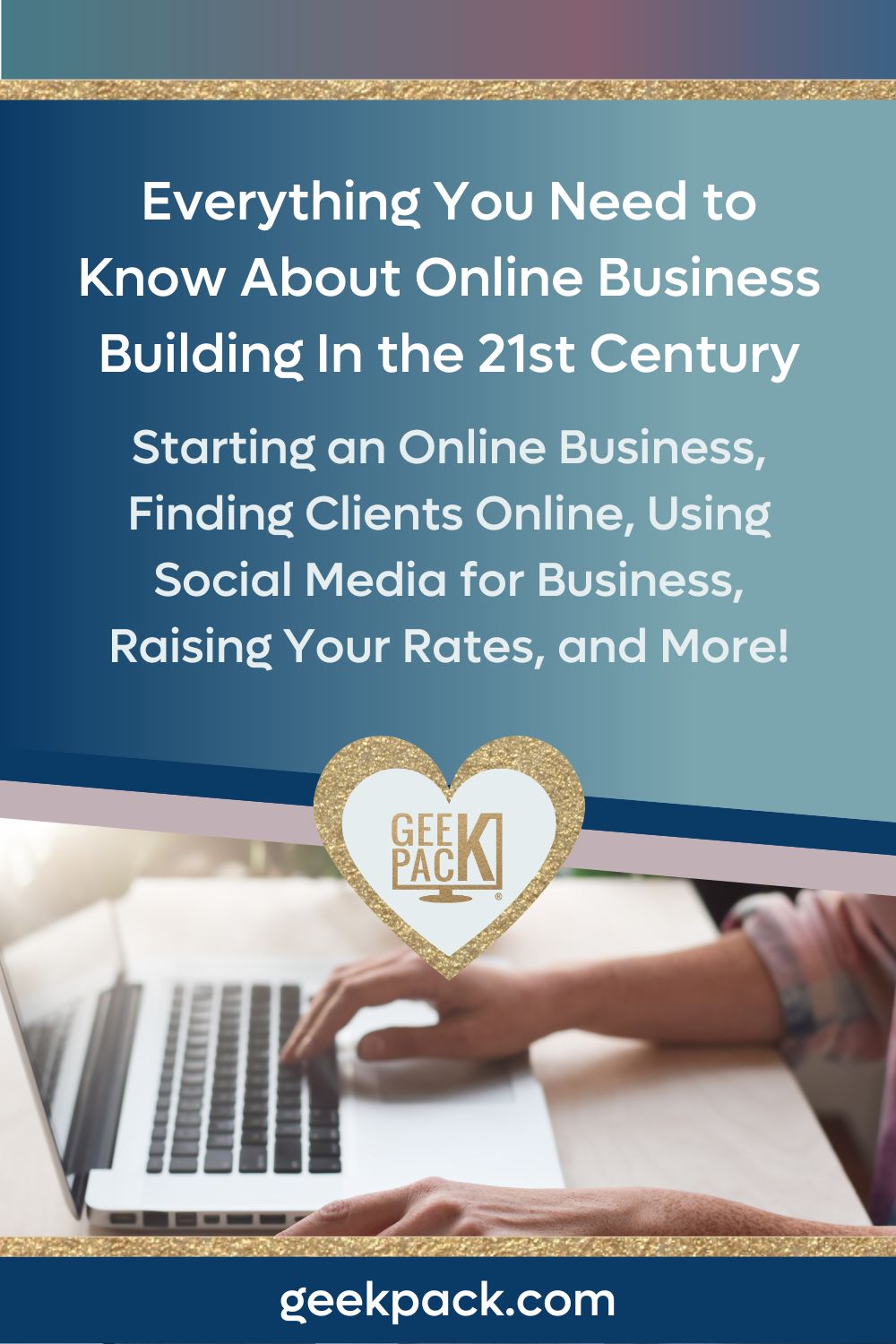Everything You Need to Know About Online Business Building In the 21st Century: Starting an Online Business, Finding Clients Online, Using Social Media for Business, Raising Your Rates, and More!
Table of Contents

Quick Tips for Helping You Get Started with Your First Online Business
You’ve heard about the endless potential that is available in building an online business. You’re tired of commuting back and forth to your 9-to-5 and you’re ready to commit to changing your circumstances.
You’re convinced that now is the time to increase your income, be your own boss, and build the life you’ve always dreamed of having. You’ve decided your “someday” begins today! But where do you start?
Why Should You Start an Online Business?
Starting an online business can be done by anyone, from the stay-at-home mom to the college student who needs extra cash. Whether you’re looking to add to your retirement fund or earn extra money for groceries, starting an online business can help you achieve any goals you have in mind.
Defining your goals and your reasons for wanting to start your online business is the first step in building your business foundation. Start with these questions in mind:
- Why are you creating this business? List all of your reasons, no matter how big or small.
- What is your mission?
- How do you want to help people?
- What is your vision?
- Who do you want to serve, and what impact do you want to make?
Consider creating a vision board and placing it somewhere you will see it regularly. This could be your phone screen or on a wall in your home. Your purpose and your vision are what will guide you as you make decisions for your business.
You’ll have lots of decisions to make and options presented to you when starting your online business. Having a solid purpose and vision will help you make the best decisions for your business.
How Do You Start an Online Business?
Depending on where you live, the legal steps involved in starting an online business can widely vary. But no matter where you live, there are five beginner steps for everyone to take:
- Find a name for your business. Check Google for copyright and trademark searches to determine if the name you want is already taken.
- Check domain and social media availability. Try Namecheap, Instagram, and Facebook to see if the website and social media handles you’ve chosen are available. Try to keep your website and social media names as close to the business name as possible.
- Set up a separate bank account for your income and expenses. It’s always the best business practice to keep your business transactions separate from your personal transactions, even in the very beginning when you aren’t making much money.
- Decide what structure you want for your business. Do you want to remain a sole proprietor or file for an LLC? Check your local county, city, and state laws for creating an LLC. Typically, filing for an LLC requires a minimal investment, but you will want to be financially prepared for this when you are ready.
- Dedicate space for your records. Where will you keep track of all of your business expenses and income? You can create space digitally, physically, or both. It is most important to determine this before your business begins.
Today, creating and building an online business is easier than ever before. Some business structures, like digital funnel marketing, allow a more hands-off approach to generating sales versus trading your time for an hourly income, like being a virtual assistant.
No matter what online business you are passionately creating, take these simple steps to build your business in an organized way. In the long run, you will build a company with both strong legal and financial foundations.

Empowering and Energizing Yourself: How to Face Imposter Syndrome
It’s easy to imagine because you’ve likely already experienced a similar scenario. You’re in the middle of a conversation with a stranger, and the perfect business opportunity arrives. She mentions her growing floral business and how she wishes she had a website where her customers could easily order arrangements.
As you open your mouth to talk about your business of building websites and setting up e-commerce, the lump in your throat makes you do something very different: stay silent.
“Do I really know as much as I think I do?”
We’ve all been there before: red-faced, flustered, fumbling over our words while attentive eyes are staring back at us.
Imposter syndrome rears its ugly head in the back of our mind when we try to speak about something we thought we confidently knew. But what is imposter syndrome, and what steps can we take to overcome it? Let’s examine it a little bit closer.
What Is Imposter Syndrome?
Imposter syndrome can be defined as “an internal experience of believing that you are not as competent as others perceive you to be.” (Source: verywellmind.com) In other words, imposter syndrome is a very real belief in not measuring up to the way others see you. It can manifest in many different ways, including:
- Self-doubt
- Self-criticism
- Self-sabotage
Types of Imposter Syndrome
Imposter syndrome doesn’t manifest in the same ways for everyone, nor is it the same type. My good friend and mindset coach Helen Henley once spoke to me about the different types of imposter syndrome:
- Perfectionism
- Superwoman (aka Super Human)
- Natural Genius
- Soloist
- Expert
Each type of imposter syndrome has a different underlying belief of what would make them feel better in certain situations. For example, the expert believes he or she doesn’t know or understand enough about a subject, creating an endless cycle of education. This type of imposter syndrome keeps someone trapped behind what they perceive as a lack of knowledge.
So if you find yourself buying course after course (yep, guilty!) because you feel like you don’t know enough yet… Then you likely have this type of imposter syndrome.
The natural genius, on the other hand, believes they’re not good enough at something because they cannot do it quickly and easily, leading to a mindset of internal shame. If you were a true expert, you’d be able to do these things effortlessly, right? Wrong! That’s just imposter syndrome talking! Identifying the root beliefs you are struggling with is a key to overcoming imposter syndrome.
Overcoming Imposter Syndrome
Changing the beliefs you have about yourself might sound easy on the surface, but it can be very difficult for many people... Myself included! You are absolutely not alone! Start with educating yourself about imposter syndrome and identifying the limiting beliefs you are struggling with.
Recognizing the destructive thought patterns when they emerge is a key part of overcoming imposter syndrome. Have a supportive network who you can turn to, and remember that nearly everyone has dealt with (or is still dealing with) imposter syndrome.
How to Conquer Your Fear of the Unknown and Find Clients for Your Business
Becoming a service provider involves lots of hard work, but the rewarding feeling of helping others is the best part! If you are in the early stages of building a service-based business, you have most likely identified what your strengths are, what your services will be, and how your strengths and services will benefit others.
You’re ready to go! But there is one big challenge that all new service providers face: How do you find clients?
How Is Your Mindset?
Finding clients is not as difficult as we sometimes imagine it to be - opportunity is everywhere! But sometimes it can feel like no matter where you look, there is nothing within reach. The good news is, changing your mindset has a lot to do with what opportunities you are able to see.
Our brains are equipped with something called Reticular Activating System, or RAS. It is the brain’s way of filtering out the massive amount of information it is exposed to at all times. It’s the reason you are able to focus on one thing at a time, like paying close attention to the baseball in a stadium full of thousands of people, sights, and sounds.
In short, what you intentionally set your mind to focus on will be what your brain can clearly see. If you want to see opportunities for new clients, set your intention to focus on finding opportunities around you. Opportunities begin with an optimistic mindset.
Where Do You Find Clients?
Once you’ve decided to have the mindset of opportunity, begin looking right in your own neighborhood - literally! Open Google Maps on your browser, and go to “street view”. Virtually walk down the streets in your city - where are the best places to find people who could benefit the most from your services? Make a list of every place you can think of, and write down their contact information.
Spend some time rehearsing your elevator pitch, and be ready to sell your services in under a minute. Who are you, and why is that important to your potential client? What do you do best, and how can that benefit them in a big way?
It’s completely natural to be nervous but remember - you are not the star of the elevator pitch, your potential client is. They are the hero of the story! Put the spotlight on them and ask questions about their business so you gain a clear understanding of their goals and how you could help them achieve those goals.
Your services will be benefiting them in a way that will make them feel like a hero in their own business. Take the heat off of yourself and remember that your potential client is the real focus of your entire pitch!
How Do You Get Referrals?
There is one big measurement of success for a service-based business that can drastically decrease the time and energy you spend finding clients: Referrals! When you lead with value, overdeliver, and impact your clients with a “wow” factor, referrals are a natural next step in the offboarding process.
Be sure to express your gratitude to your clients for their business not only in the offboarding process but right from the moment you onboard them. Consider a small investment in thank you gifts, or offer an incentive to them for referrals.
Skills Are Not Enough to Find Clients
Skills alone are not enough to run a successful online business. You must also learn how to find clients and this is often the most intimidating part of a new business venture. By cultivating an open mindset that is focused on opportunities, you will begin to see a world of opportunities (and clients!) around you. Rehearse and be ready to tell any potential client who you are, what you do, and how it benefits them in an impactful way. And remember, always lead with value!

How to Elevate Your Mindset, Increase Your Rates, and Grow Your Online Business
I see too many online service providers decreasing instead of raising their rates. Many people believe charging less money for their services will attract more clients. We call this the ‘race to the bottom’.
I want to challenge you to do the exact opposite! Raise your rates and race to the top by being the most expensive. But at the same time, be the most valuable online service provider you can be! I went from $20/hr to $75/hr in less than 6 months and I have students who are able to do the same… But much faster than I did!
In the traditional work model, the company you work for determines your pay, and bonuses and raises can be rare or nonexistent. One of the greatest benefits of starting your own business is not only setting your own rates but increasing them as you choose.
Instead of negotiating for your salary raise, raising your rates in your own business is a personal decision. But how can you feel good about raising your rates, and how do you know when it’s the right time? Let’s take a closer look at one of the biggest decisions you will make for yourself in your business.
Raise Your Mindset
Imposter syndrome can take a toll on your ability to increase your rates as you go along in your business. Regardless of the education, experience, and portfolio work you have, imposter syndrome can paralyze your momentum. It can make you doubt yourself and your abilities.
But, not raising your rates can actually cost your business in many ways. Less income from your business hinders you from more education and more investments into your business. It prevents you from achieving the mission and vision you created for your business. Raise your mindset before you raise your rates! Examine the long-term setbacks that will result as you resist leaning into rate increases.
Raise Your Investments
Investing in your business is more than a matter of office supplies and equipment - it’s also a matter of your skills and capabilities. You cannot gain a profitable in-demand skill from free downloads, YouTube videos, and Google searches alone.
Depending upon free methods of learning will inevitably leave you with more imposter syndrome than ever before, as your understanding and capabilities will not be concrete. Making investments in courses, workshops, or other materials that give you foundational knowledge and a full scope of understanding is necessary for any growing business.
Raise Your Capabilities
After you’ve made steps in raising your investments, put in the work to raise your capabilities. Complete the coursework, attend the workshops, network with other entrepreneurs, and increase the confidence you have in your capabilities.
The more skills you add to your capabilities, the more your rates should be raised. The more knowledge and experience you have, the more value you can provide. You should feel empowered to charge a fair rate for the value you have to offer.
Raise Your Rates
Raising your rates should not be the most difficult part of building your business. After raising your mindset, your investments, and your capabilities, the natural next step is raising your rates because the value of your work to your clients has increased.
As you work with more clients and add to your experience level, raising your rates will be a more comfortable (and hopefully, more regular) practice for you. Remember, you are in the driving seat when it comes to raising your rates and charging your worth!


How to Harness the Power of Social Media for Your Online Business
Building an online business with today’s technology has one major advantage: social media. I hate to break it to you, but when you run an online business, social media is no longer for fun. It is for business.
Gone are the days of relying on word-of-mouth, advertising with business cards, networking events, and newspaper and magazine ads. While those methods can still work for some businesses, social media has completely changed the landscape of advertising for small businesses.
If you’re new to using social media for business, let’s take a look at how you can begin leveraging social media platforms to grow your business.
How Does Social Media Work?
Social media is a powerful tool for businesses. It allows for direct interaction between you and your customers or clients. As a business owner, this allows you to get a deeper, closer look into the struggles your clients are facing and what needs they have.
The more information you have about your clients' challenges, the more you can provide profitable solutions. Your social presence gives your clients an insight into who you are and allows for meaningful relationships to be built.
But, there is one significant challenge - how do you find your ideal audience on social media? Depending on what platform you use, there are many strategies for reach and growth you can use to create your niche on social media. From hashtags to posting frequency to content management, you can easily target your ideal audience by curating your content specifically for them.
Should I Use Facebook for Online Business?
Facebook is the largest social network with millions of active users. The audience you want to target is more than likely on this platform. Thousands of small business owners use Facebook for their paid advertising based on targeted data.
But with recent changes to Facebook advertising, using data to target customers is no longer enough to make a profitable impact on sales. Facebook now rewards creativity and authenticity, and places a significant value on ‘live’ video content.
No strategy can outperform genuine connections and engagement between business owners and audiences. Your efforts in these areas on Facebook can be very profitable for your business.
Should I Use Instagram for Online Business?
Instagram is owned by Facebook and is one of the most popular platforms for businesses. Think of Instagram as a mini-magazine or a brochure - it is where the pictures capture the story of your business.
Additionally, Instagram has video capabilities in the form of Stories and Reels. Stories are short videos or pictures you can promote that only remain on your profile for 24 hours. This gives you a great opportunity to engage your audience without overloading their Instagram feed. Reels is the latest addition to Instagram, which is similar to TikTok.
Should I Use LinkedIn for Online Business?
LinkedIn is another networking platform that is utilized by businesses. This is a very business-centered platform so if you’re looking to connect with other online business owners, this could be the place for you.
LinkedIn is a platform for job-seeking professionals to connect with businesses. It now gives the capability to “like”, post, and share curated content like Facebook and Instagram. You can grow your network, add your work history and education, and list your professional skills.
With LinkedIn, you can increase your visibility to professionals and businesses looking to recruit and hire.
Which Platforms Should I Use?
The most important thing is to not feel overwhelmed by social media platforms, and not feel pressured to use all of them. Depending on what your business is, some platforms might not be relevant to your industry.
For example, if you are a professional baker or cake decorator, LinkedIn might not be a relevant platform for growing your business. Additionally, only choose between 1 or 2 platforms to focus on to start with. Expanding your reach and growing your influence takes time, intention, and lots of strategizing.
Don’t overwhelm yourself or your business with social media reach. If your budget allows, consider hiring a social media savvy virtual assistant to curate your social media accounts for a few hours each week. As your business grows, so will your online presence.

Jumpstart Your Online Business and Engage with Your Audience on Facebook
One of the easiest ways to build credibility for new small business owners is by utilizing the power of social media, and Facebook can be a powerful tool for doing just that.
With millions of users on Facebook every day, you can’t afford to NOT use social media to grow your reach by building meaningful connections in a worldwide audience. Here’s a closer look at how to get started with Facebook for business.
Separate Personal From Business
Your Facebook business page should be separate from your personal Facebook profile page. While you will not want to use your personal Facebook page for your business, it’s important to keep in mind that anything on your social media profiles can (and will) be viewed by future clients.
Spend some time looking at your social media pages from a public view to see if there is anything you do not want to be seen by potential clients. While you can certainly talk about your business on your personal Facebook page, you do not want to utilize it as a source of information and marketing for your business.
Professional Facebook Business Page
Once you create your Facebook business page, there are a few steps you can take to create a clean, professional image for your business. Ensure your headshot is a clear image of your face, but also make sure it is not a “selfie” style picture. Have someone take the photo for you, or use the self-timer on your camera.
Whatever your personal style is, be sure to include this in your photo. Your brand is a representation of who you are, and the more authentic you are with your photos, the more your clients know what to expect.
Change Your Facebook Page Title
Secondly, define your title and role in your business. If you create WordPress websites for clients, you could be the “WordPress Web Developer” and “CEO” of your company. No matter if you are the only employee or if you haven’t signed your first client, you are still the Founder and CEO so start stepping into that role.
I always encourage my students to change their job title immediately. Not only does it help you start behaving like an online business owner, but it will also start to attract clients to you.
Branding Your Business Facebook Page
Thirdly, make sure you have a collection of graphics that strongly represent your brand image. Choose a color palette and 1-2 fonts to create consistency. While you don’t have to invest in a graphic designer, you certainly can if your budget allows.
If you do not have the budget as a start-up company, you can create a Canva account and create simple headers and logos for free.
Using Testimonials on Your Facebook Business Page
Lastly, always ask for and include client testimonials to publish on your business page. Client testimonials give your future potential clients confidence in your work. Not only this, but each of these elements will create a measure of trust with your potential clients. Taking the time to create a polished image with consistent graphics that promote who you are can elevate your entire business.


How to Go Beyond the Influencers and Use Instagram for Your Business
It is common to associate Instagram with influencers when we’re often inundated with immaculately curated feeds and sponsored posts. Like Facebook, Instagram also offers opportunities to create valuable content and meaningful connections with your audience.
However, the number of Instagram users is smaller than the number of Facebook users, making it a little different in terms of reach. Despite the differences, Instagram still has much to offer the small business owner looking to grow their business reach with hashtags, organic engagement and paid advertising.
Getting Started
Instagram marketing strategies are everywhere. You can do a Google search for curating an Instagram feed, using hashtags, or becoming an influencer and find hundreds of ideas, tips, and tricks. That’s because Instagram remains a very profitable platform that allows you to utilize many different features to grow your small business.
On top of that, Instagram also gives options for paid advertising in the form of posts, stories, IGTV, and the explore page. The possibilities are endless!
I only really started to use Instagram for my business when Neil and I began our full-time travel journey around the states in 2018. If you check out #destinationnomad, you’ll be able to see some of our old posts!
I hadn’t truly realized the power of this platform until then, and while the nature of my account has shifted from full-time travel to more online business related content, it remains an incredibly powerful business tool for creating meaningful connections with my audience.
Instagram Engagement
Engagement is one big key to success on the Instagram platform, and posting consistently will reap many rewards for your Instagram page. There are no shortcuts here - Instagram wants to see genuine interaction, not quick attempts to gain vanity metrics like follower counts. For a long time, I would either post daily or not at all for months and my account suffered because of it.
My audience didn’t know what to expect from me because I wasn’t consistent. Whenever I did post, the engagement wasn’t as good as it could have been. Consistent doesn’t have to mean daily. It can be every other day or twice a week just so long as you pick a routine and stick to it. According to Instagram, there are three main factors associated with the Instagram algorithm:
- Interest
- Recency
- Relationship
In other words, Instagram dictates a user’s feed by determining how interested the user might be in a post, how recent the post was created, and how close the user is with the account that made the post. Engagement is a big factor in whether or not you are seen on your followers’ Instagram feeds and also showing up on the Discover page.
Instagram Relationship Building
No matter what technology comes and goes, nothing will ever beat the building of truly engaged relationships. There are no shortcuts in building relationships with your potential clients or customers.
Spend some time each day, whether it’s 10 minutes or 30 minutes, and engage with your followers. Reach out to new people who are not your followers. Nothing will benefit your long-term growth more than loyal, genuinely interested customers in your business.

Expand Your Network and Make New Connections for Your Business with LinkedIn
Social media is a powerful tool for marketing and business, but most people don’t think about LinkedIn when they think of social media. LinkedIn is a professional social network utilized by companies and job seekers, but it isn’t just for job searches.
It’s also for building networks, nurturing connections, expanding your business partnerships, and finding clients. I neglected LinkedIn for way too long but over the past 12 months, I have been actively using it to make genuine and meaningful connections with my audience and provide as much value to them as I can.
Getting Started With LinkedIn
LinkedIn has different functionalities that make it a social network similar to Facebook and Twitter. You can publish or share articles, write longer posts as you would on Facebook, or compose short updates as you would on Twitter. You can also increase your visibility on LinkedIn by utilizing hashtags, just as you would on Instagram.
Start on LinkedIn as you would on Instagram - define your target audience, and understand their likes, interests, and struggles. Curate your content to make it relevant and interesting to the audience you want to attract. Research LinkedIn strategies, and test one method at a time so you know what is working to grow your audience and engagement.
As an online business owner, I would start by making sure that your headline and description on LinkedIn are optimized to attract the people you want to connect with (ie, clients!).
Make sure the kinds of words and key phrases that your potential clients will be searching for are scattered around your profile. And be sure to mention your mission and vision in your description so people will know who you are, what you do, and who you help.
Growing Your Reach on LinkedIn
Like other social media platforms, you are not in control of how the platform performs by its algorithm. Focus on what you can control on the platform - growing your audience and forming genuine connections with them.
Avoid repetitive or generic comments and replies, and personalize as many of your messages as you can. I message all my new connections on LinkedIn asking them to tell me something interesting that they’re working on.
This starts a meaningful conversation and helps me learn about the people in my network. It also encourages people to ask me about what I do in return which creates a mutually beneficial relationship.
What to Post on LinkedIn
Post relevant and meaningful content, and adhere to a regular posting schedule. Social media is more effective when you post regularly. Posting at the same time each day or week creates an expectation from your audience. You will begin to cultivate loyalty and trust, simply by being a regular and positive presence on their feeds.
This type of method is the most effective and will ensure consistent growth for your LinkedIn profile. But remember, LinkedIn is first and foremost a business platform so make sure your content is more business-centric than lifestyle-focused.
While there are dozens of tips, tricks, and methods for growing your reach quickly on every social media platform, try to avoid the temptation to grow quickly by strategy alone.
Remember that there is no method as reliable as genuine conversation and interactions. Relationships take time to form, and relationships on social media are no different than those in your personal life.








